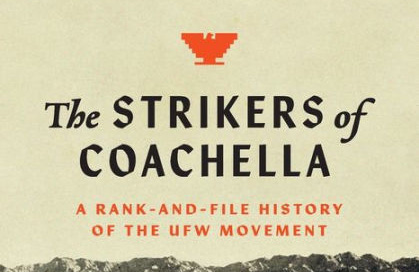Latino Studies, with Christian Paiz
I spoke with Christian Paiz, a professor at UC Berkeley and author of the new book, The Strikers of Coachella: A Rank-and-File History of the UFW Movement. Christian is thoughtful and soulful and a very good writer. I think you’ll enjoy our conversation.
Cesar Chavez is almost certainly the most famous figure from the Chicano and Mexican American movement for civil rights. With Dolores Huerta and others, he co-founded the United Farm Workers, the first union of agricultural workers to sign labor contracts with California’s growers and ranchers, who Paiz calls representatives of “The Rancher Nation.”
Chavez cited Mahatma Gandhi and Martin Luther King, Jr. as influences. He led a march from the California-Baja California border to Sacramento, to bring national attention to the plight of farmworkers and lobby for change. He was on the cover of Time Magazine, streets are named after him, and his face is on a commemorative stamp. The union successfully organized a national grape boycott.
Paiz has a lot to say about how our understanding of Chavez and the UFW movement can change if we look at the rank-and-file in a place like Coachella, California, much better know these days for the music and arts festival that Bad Bunny is about to headline. He calls for a broad reappraisal of the United Farm Workers seen from the perspective of local communities, which will both uphold and in some ways challenge the national, largely celebratory, stories we tell about Chavez and the farmworkers.
Paiz discusses the arguments that a number of historians have recently made about Chavez and the UFW, but he also explains how he was influenced by Black historians and writers including Robin D.G. Kelley, James Baldwin, and Charles Payne.
Lastly, and most illuminating to me, Paiz—based on literally hundreds of interviews with Coachellans (is that a thing?), some of them farmworkers, some of them not—complicates our understanding of what we tend to view rather narrowly as the successes or failures of movements for social, political, and economic justice.
Here’s the interview:
I also want to apologize for not publishing for two weeks! I feel like I have a contract with you, and it’s important to me to hold up my end of the bargain. There has also been a lot of Latino-related news, including a new-ish refugee program, the possibility that “Hispanic or Latino” will be included as racial designations on the 2030 census, and Republican-led hearings on the so-called border crisis. It’s just that universities for some reason choose winter to do all of their planning for the following academic year; Ph.D. admissions, the hiring of new faculty, course planning, etc. Some of that is slowing down now, so I’ll have more time to write.




